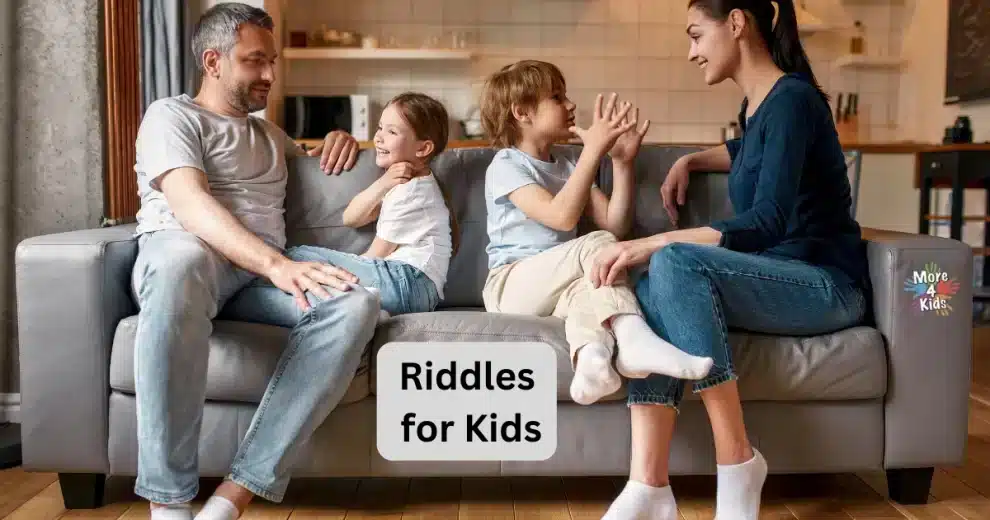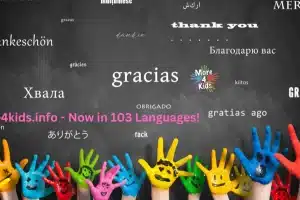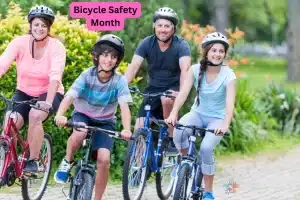Hey there, fellow parents, ready for some mind enriching riddles for kids?🌟
Ever find yourself in a car ride that’s just a tad too quiet? Or maybe you’re trying to make dinner and need a quick activity to keep the kiddos engaged? Enter the magical world of riddles! These aren’t just your run-of-the-mill knock-knock jokes; we’re talking about brain-boosting, giggle-inducing riddles that can turn any mundane moment into a mini-adventure for the mind.
Just last week, Lily, my 7-year-old, came up to me with this gem: “Mom, what has keys but can’t open locks?” I was stumped for a second before she gleefully yelled, “A piano!” We both burst into laughter, and it got me thinking—why not share the joy and benefits of riddles with all of you?
So, buckle up as we explore the fantastic benefits of riddles, age-appropriate examples, and how to make riddle-solving a fun family affair. Let’s get started!
Why Riddles for Kids are More Than Just Child’s Play
Table of Contents
Cognitive Benefits of Riddles
Okay, so we all know riddles are fun, but did you know they’re actually little brain workouts in disguise? That’s right! According to a study from Harvard University, engaging in problem-solving activities like riddles can improve cognitive function in children (Harvard University).
First off, riddles are like mini puzzles that require our kids to think outside the box. They have to use their problem-solving skills to figure out the answers, and let me tell you, the look on Max’s face when he solves a tricky one is priceless! 🌟
Secondly, riddles are a fantastic way to boost vocabulary and language skills. When Lily encounters a word she doesn’t know in a riddle, it becomes a learning moment. We look up the word together, and voila, her vocabulary expands!
Social Benefits of Riddles for Kids
But wait, there’s more! Riddles aren’t just solo activities; they’re also fabulous for social interaction. Remember those long car rides to Grandma’s house? Instead of everyone zoning out on their devices, we turn it into a riddle showdown. It’s not just entertaining; it’s a bonding experience.
Plus, riddles teach kids how to take turns, listen carefully, and even handle the sweet agony of defeat when they can’t guess the answer. These are all essential social skills that will serve them well in life.
Age-Appropriate Riddles for Kids at Every Stage
Hey there, fellow riddle enthusiasts! 🌟 If you’re anything like me, you know that riddles for kids aren’t just a way to pass the time; they’re a fantastic tool for sharpening those little minds. But let’s face it, not all riddles are created equal. What tickles the brain of my 10-year-old Max might fly right over the head of my 7-year-old Lily. That’s why I’ve put together this fabulous list of age-appropriate riddles for every stage of your child’s development.
From the simplest questions that’ll have your toddlers giggling, to the more complex brain teasers that’ll get your tweens thinking, this section has something for everyone. So gather the kiddos, because it’s time to challenge those neurons and have a whole lot of fun doing it!
Riddles for Toddlers (Ages 2-4)
1. Example: “What’s full of holes but still holds water?”
Answer: A sponge
Why It Works: This one’s a classic! Lily used to call sponges “water magic” when she was a toddler.
2. Example: “What’s always in front of you but can’t be seen?”
Answer: The future
Why It Works: It’s a simple yet profound concept that even toddlers can grasp.
3. Example: “What has a ring but no finger?”
Answer: A telephone
Why It Works: It’s a fun way to introduce them to objects that have “body parts” but aren’t alive.
4. Example: “What’s tall when it’s young and short when it’s old?”
Answer: A candle
Why It Works: This riddle introduces the concept of change over time, which is a big deal for little minds!
5. Example: “What has a thumb and four fingers but isn’t alive?”
Answer: A glove
Why It Works: Lily used to giggle so much at this one, imagining gloves coming to life!
Riddles for Young Kids (Ages 5-7)
1. Example: “What has to be broken before you can use it?”
Answer: An egg
Why It Works: This was one of the first riddles Lily ever solved, and she was so proud!
2. Example: “What comes down but never goes back up?”
Answer: Snow
Why It Works: Lily and Max both love this one, especially when they’re eagerly waiting for a snow day.
3. Example: “What has a neck but no head?”
Answer: A bottle
Why It Works: This one got Lily thinking about how objects can have “body parts” but serve different functions.
4. Example: “What’s so fragile that saying its name breaks it?”
Answer: Silence
Why It Works: This one’s a bit more abstract and introduces the concept of intangible things.
5. Example: “What has one end but no beginning?”
Answer: A rainbow
Why It Works: This riddle is a bit more poetic and led to a lovely conversation with Lily about the beauty of nature.
Riddles for Young Kids (Ages 8-12)
1. Example: “What has keys but can’t unlock doors?”
Answer: A piano
Why It Works: This riddle had Max scratching his head for a moment. It’s a great way to get kids thinking about how the same word can have different meanings in different contexts.
2. Example: “What comes once in a year, twice in a week, but never in a day?”
Answer: The letter ‘E’
Why It Works: Lily loves this one because it makes her think about the structure of words and how they can be a riddle in themselves!
3. Example: “What has a heart that doesn’t beat?”
Answer: An artichoke
Why It Works: This one got both Lily and Max thinking about how words can be metaphorical. Plus, it sparked a conversation about what artichokes are!
4. Example: “What can travel the world while staying in a corner?”
Answer: A stamp
Why It Works: This riddle had Max pondering about objects and their functions. It’s a fun way to think about how something small can be part of something much bigger, like global communication.
5. Example: “What has a ring but no finger?”
Answer: A telephone
Why It Works: Lily was quick to answer this one! It’s a great way to get kids thinking about how words can have multiple meanings, and how technology has its own kind of “language.”
There we go! Five riddles for kids at each age group, complete with personal anecdotes and explanations. I hope these riddles bring as much joy and thoughtful conversation to your family as they have to mine. So, what do you think? Ready to move on to making riddle time a family affair? Want More? Here you go!
| Age Group | Riddle | Answer |
|---|---|---|
| Toddlers (1-2) | What has keys but can’t open locks? | A piano! |
| What comes down but never goes up? | Rain! | |
| What has a face and two hands but no arms or legs? | A clock! | |
| What is full of holes but still holds water? | A sponge! | |
| What is so fragile that saying its name breaks it? | Silence! | |
| What is always in front of you but can’t be seen? | The future! | |
| What has a thumb and four fingers but is not alive? | A glove! | |
| What has to be broken before you can use it? | An egg! | |
| What has one head, one foot, and four legs? | A bed! | |
| What is so light you can hold it for hours, but too heavy to hold for a minute? | Your breath! | |
| Preschool (3-4) | What has a heart that doesn’t beat? | An artichoke! |
| What comes once in a minute, twice in a moment, but never in a thousand years? | The letter ‘M’! | |
| What has an endless supply of letters but starts empty? | A mailbox! | |
| What has one eye but can’t see? | A needle! | |
| What has a neck but no head? | A bottle! | |
| What gets wetter as it dries? | A towel! | |
| What has ears but can’t hear? | A cornfield! | |
| What comes in many different shapes but is always a circle? | A hula hoop! | |
| What can you catch but not throw? | A cold! | |
| What has teeth but can’t eat? | A comb! | |
| Elementary (5-7) | What has cities but no houses, rivers but no water, and forests but no trees? | A map! |
| What comes first, the chicken or the egg? | The egg, but not the chicken egg! | |
| What has many keys but can’t open a single lock? | A computer keyboard! | |
| What belongs to you but other people use it more than you do? | Your name! | |
| What has a head, a tail, but no body? | A coin! | |
| What has words but never speaks? | A book! | |
| What can be cracked, made, told, and played? | A joke! | |
| What has a ring but no finger? | A telephone! | |
| What comes up but never comes down? | Your age! | |
| What has an endless supply of letters but starts empty? | A mailbox! | |
| Tweens (8-12) | What has a head and a tail but no body? | A coin! |
| What comes once in a year, twice in a week, but never in a day? | The letter ‘E’! | |
| What has a bottom at the top? | Your legs! | |
| What has an endless supply of letters but starts empty? | A mailbox! | |
| What can travel around the world while staying in a corner? | A stamp! | |
| What has a heart that doesn’t beat? | An artichoke! | |
| What comes once in a minute, twice in a moment, but never in a thousand years? | The letter ‘M’! | |
| What gets wetter as it dries? | A towel! | |
| What has many keys but can’t open a single lock? | A computer keyboard! | |
| What belongs to you but other people use it more than you do? | Your name! |
Resources for Riddle Lovers
Riddle Books for All Ages
“The Jumbo Book of Silly Riddles“: This book is a treasure trove of laughs and head-scratchers. Perfect for kids and adults alike!
“Riddles and Brain Teasers for Clever Kids“: This one’s aimed at the 8-12 age group and is filled with challenging riddles that even stump me sometimes.
“The Little Book of Big Brain Games: 517 Ways to Stretch, Strengthen and Grow Your Brain“: This book is not just about riddles; it includes all sorts of brain games. Max loves the variety!
“The Riddle Book for Kids“: A fantastic book for younger kids, filled with age-appropriate riddles that are both fun and educational.
“The Great Book of Riddles: 250 Magnificent Riddles, Puzzles and Brain Teasers“: This one’s for the serious riddle aficionados in the family. It’s got a mix of classic and modern riddles, and it’s a hit with everyone from Lily to Grandma!
There you have it—a top 5 list of riddle books that should keep your family entertained and intellectually stimulated for quite some time! Whether you’re looking for something light and fun or a real brain-bender, there’s a book on this list for you. So go ahead, make some room on your bookshelf and get ready for hours of riddle-tastic fun! 🎉
What do you think? Ready to hit that “Add to Cart” button? 😄
Making Riddle Time a Family Affair
Let’s be real, parents. In this digital age, it’s so easy for each family member to retreat into their own little tech bubble. But guess what? Riddles for kids or funny jokes for kids are the perfect antidote to screen overload! They’re like mini brain vacations that the whole family can enjoy together. So, how do we make riddle time a regular part of family life? Let’s explore!
Riddle Games for Family Game Night
Family game night is a sacred tradition in our household. We’ve got board games, card games, and yes, riddle games! One of our favorites is “Riddle Me This,” a game where each person takes turns asking a riddle, and the others have to guess the answer. The one who guesses the most correct answers wins a prize—usually picking the next movie for family movie night.
Example: Max loves to stump us with this one: “I speak without a mouth and hear without ears. I have no body, but I come alive with the wind. What am I?” The answer is an “echo,” and let me tell you, it took a few rounds before Lily finally nailed it!
Incorporating Riddles for Kids into Daily Life
But hey, you don’t have to wait for game night to enjoy riddles. We’ve made them a part of our daily routine. During breakfast, I’ll slip a riddle into Lily’s lunchbox, and she’ll try to solve it by the time she comes home. It’s like a little midday brain teaser!
Example: A recent lunchbox riddle was, “What has a neck but no head?” Lily couldn’t wait to tell me she’d figured out it was a “bottle” when she got home!
Car rides are another riddle goldmine. Instead of the dreaded “Are we there yet?” you’ll hear, “Give us another riddle, Mom!” It’s a fantastic way to pass the time and keep everyone engaged.
Example: On our last trip to Grandma’s, Lily stumped us all with, “What comes once in a minute, twice in a moment, but never in a thousand years?” Max was the first to shout, “The letter ‘M’!” High fives all around!
Seasonal and Holiday Riddles
Don’t even get me started on holiday riddles; they’re a whole category unto themselves! Whether it’s spooky riddles for Halloween or festive ones for Christmas, seasonal riddles add an extra layer of fun to holiday celebrations.
Example: Last Christmas, Max asked, “What do you get if you cross a snowman and a dog?” We were all puzzled until he revealed the answer: “Frostbite!” We all burst into laughter, and it’s become a holiday riddle classic in our home.
So there you have it, folks! Riddles aren’t just for passing the time; they’re a fantastic way to bring the family together, spark some intellectual curiosity, and let’s be honest, share some hearty laughs. From game nights to car rides to holiday celebrations, there’s always an opportunity to slip in a riddle or two. So why not start your own family riddle tradition? Your kids’ brains will thank you, and who knows, you might just become the reigning Riddle Queen or King of the household!
Summary
So there you have it, folks! From the benefits of riddles for your kiddos’ developing brains to making riddle time a cherished family tradition, we’ve covered it all. We’ve even given you a treasure trove of resources to keep the riddle fun going strong. Whether you’re a riddle rookie or a seasoned pro, there’s something in this guide for everyone.
Remember, riddles for kids aren’t just a way to pass the time; they’re a fantastic tool for family bonding and intellectual growth. So why not start your own family riddle tradition? With the books, games, and apps we’ve recommended, you’ll be well on your way to becoming the reigning Riddle Queen or King of your household!
So go ahead, challenge your kids, challenge yourself, and most importantly, have fun! Because in the end, that’s what riddles are all about—bringing joy and curiosity into our lives. Happy riddling, everyone! 🎉
Frequently Asked Questions (FAQ)
Are riddles good for my child’s development?
Absolutely! Riddles for kids help encourage critical thinking, improve vocabulary, and promote problem-solving skills. They’re a fun and engaging way to boost your child’s intellectual growth.
What’s the best age to start introducing riddles to my child?
It’s never too early to start! Even toddlers can enjoy simple riddles. As your child grows, you can introduce more complex riddles suitable for their age and understanding.
How do I make riddles a family activity?
From incorporating riddles into family game nights to slipping them into lunchboxes or using them on car rides, there are countless ways to make riddles a family affair. Check out our section on “Making Riddle Time a Family Affair” for more ideas!
Where can I find good riddles for kids?
There are plenty of resources available, from books to apps to websites. Our “Resources for Riddle Lovers” section provides a comprehensive list to get you started.
Are riddles only for kids?
Not at all! Riddles are fun for all ages. They’re a great way to challenge your own brain and keep your cognitive skills sharp.
Can riddles help improve my child’s academic performance?
While riddles alone won’t turn your child into a straight-A student, they can certainly help improve skills like critical thinking and problem-solving, which are valuable in an academic setting.
Are riddles and jokes the same thing?
While both aim to entertain, riddles are generally designed to challenge the mind and require a solution, whereas jokes are meant purely for amusement.
How often should we do riddles as a family?
As often as you’d like! Whether it’s a daily ritual or a special family game night activity, the frequency is entirely up to you.
Are there riddles for special occasions or holidays?
Yes, there are! Seasonal and holiday-themed riddles can add an extra layer of fun to your celebrations. We even included some examples in our guide!
What if my child finds riddles frustrating?
It’s important to choose age-appropriate riddles and offer hints if needed. The goal is to make it challenging yet achievable, turning any frustration into a triumphant “Aha!” moment.












Add Comment